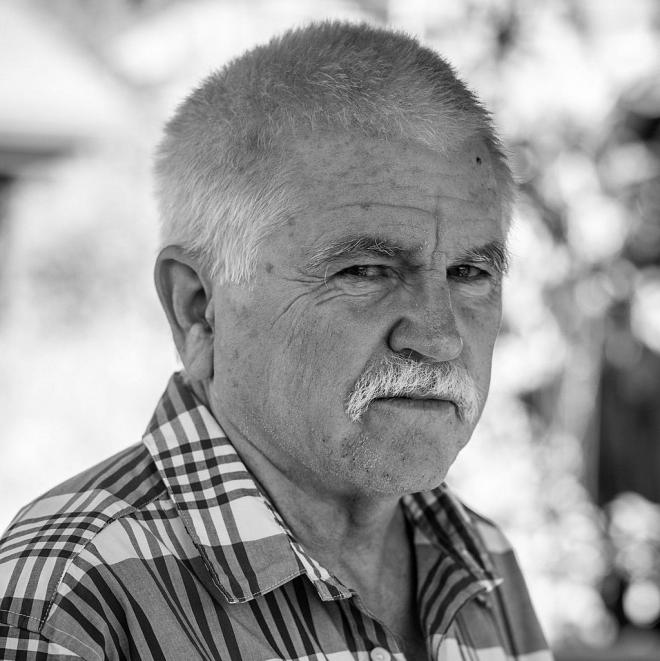Tom Reifer

ON OCTOBER 25, 2022, Mike Davis, the legendary scholar — activist and veteran of many social movements from the 1960s onward, who became one of the most prolific, brilliant lights in the progressive universe, passed away. Born in the Fontana suburb of Los Angeles in 1946, his family moved to San Diego when he was young, and Mike grew up here. Born into a working-class Catholic family, Mike was transformed by the Black Civil Rights movement, his “burning bush.” After long stints as a meat-cutter and long-distance truck driver, in the 1980s, Mike moved to London, becoming a long-time editor of New Left Review, and remained active on the editorial board until his final days.
Notably, Davis edited the Review’s Haymarket Series, dedicated to the legacy of Chicago’s Haymarket martyrs, murdered for their tireless activism for labor and immigrant rights, in the aftermath of the May Day uprising in 1886. Davis’s brilliant study, Prisoners of the American Dream: Politics and Economy in the History of the U.S. Working Class a wide-ranging analysis of the U.S. working class, was published in 1986, on the hundredth anniversary of these struggles and a half a century after the heroic strikes of the Congress of Industrial Organizations (CIO), which spear-headed the radical industrial trade union movement in the U.S., led by 2nd generation immigrants, ensured that the US wouldn’t take the fascist turn, in contrast to much of Europe during this same period.
In chapters such as “The Barren Marriage of American Labor and the Democratic Party,” some of which were published earlier in New Left Review, Davis arguably and presciently foretold of a future where Donald Trump would capitalize on the betrayal of the working class, while “The Political Economy of Late Imperial America,” replete with a section on “The Origin of the NATO State System,” envisaged the durability of America’s continued quest for hegemony. Such structural imperatives of empire ushered in the expanding future for NATO after the collapse of the Soviet superpower, so as to contain enemies and allies (in Western Europe), contributing mightily to the tragic and destabilizing consequences for European and world security so evident today, revealed most poignantly and tragically in Russia’s illegal and criminal invasion of Ukraine, in a war that seems to have no end in sight.
Also coming out during the 1980s and 1990s was the multivolume, The Year Left: An American Socialist Yearbook. What followed Prisoners, though, was Davis’s magisterial book, undoubtedly his most famous, City of Quartz: Excavating the Future in Los Angeles (Verso, 1990, 2006), efforts which earned him a prestigious McArthur genius award in 1998. Ecology of Fear: Los Angeles and the Imagination of Disaster (1998), Late Victorian Holocausts: El Nino Famines and the Making of the Third World (2001), and Under the Perfect Sun: The San Diego Tourists Never See (with Jim Miller and Kelly Mayhew) (2003) followed soon on its heels. After publishing Planet of Slums (Verso, 2006), the Vatican invited him to meet the Holy See.
More recently, Davis published Buda’s Wagon: A Brief History of the Car Bomb (2007), In Praise of Barbarians: Essays Against Empire (2007), Magical Urbanism: Latinos Reinvent the U.S. Big City (2012), No One is Illegal: Fighting Racism and State Violence at the U.S.-Mexican Border (with Justin Akers Chacon) (2016), Set the Night on Fire: Los Angeles in the 1960s (2020), with Jon Weiner, Old Gods, New Enigmas: Marx’s Lost Theory (2020), and The Monster Enters: COVID 19, the Avian Flu, and the Plagues of Capitalism (2022). In the final years of his life, Davis completed Taking the Temperature of History: Le Roy Ladurie’s Adventures in the Little Age Ice, a critical homage to a pioneer of the Annales School, so influential for historical sociology; and was working on Star-Spangled Leviathan, An Economic History of American Nationalism. The voluminous scholarship catapulted Davis to the top ranks of world urbanists.
Noted for his wide-ranging, world-historical perspective, attention to the political economy and ecology of militarism, empire, U.S. politics, foreign policy, and global social change, focusing on disenfranchised and marginalized communities, including communities of color, and the working class broadly conceived, Davis insisted on seeing people as agents of their own liberation. Davis understood, and demonstrated through his scholarship and activism, that another world is indeed possible. Here, too, the most important characteristics of Mike’s works came through: its internationalism, its commitment to global solidarity, upholding the legacy of Third World radicalism, and efforts to overthrow Stalinism in the so-called second world, support for social movements in the advanced capitalist countries, and efforts at transnational solidarity and activism. Such impassioned analysis, accompanied by tireless activism, are essential if humanity is to overcome the entwined threats of catastrophic climate change, the very real possibility of a nuclear holocaust, and the hollowing out of the dreams of future generations in the face of today’s astounding inequalities of wealth and power.
All of Mike’s work was firmly rooted in the finest traditions of the internationalism of the progressive left, and his lifetime work of scholarship and activism sought to make such international solidarity a reality. In a world today, where nationalistic xenophobia, and ethnoreligious nationalist movements are swelling to high tide, Mike’s relentless rage against the machine, swimming against the current, analyzing the present, so as to arm scholars and activists to map out and build alternate futures, is a shining example for today’s generation, and those to come. It is only to be hoped that today’s generation will honour Mike’s lifetime of contributions to scholarship and activism, to help us to understand the world, and to transform it to meet the urgent challenges of the 21st century, as humanity stands at a crossroads. There could be no better tribute to Mike’s legacy, than to try to emulate, and thus honour, an exemplary life of study and struggle, one of the most astonishing, and most accomplished, of our times.
